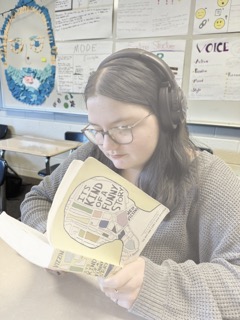
The pencil flies across the page. Erase marks are scattered like drops of paint across a blank canvas. The creator of the work of art? A student with music blasting in their ears and their head in the clouds or maybe not?
Teachers and parents all across the board are most definitely wondering what the answer to this question is. Does music actually help with productivity? Does it genuinely boost the results of academic performance? Or does it do more harm than good?
“I usually am listening to music for most parts of my day, especially when studying and working out,” sophomore Cota Barmore said. “In school, whenever I have the chance, my AirPods are in. Honestly, I think that music neither helps nor distracts me in itself, but I think that it blocks out any excess noise which really helps me study or focus on work.”
In a study from the National Library of Medicine, 244 workers of different backgrounds were tested. According to their results, listening to music to boost motivation led to better performance; however, when using it as a means of concentration, there was no notable boost in performance rates, and music used as a means of background music led to negative productivity rates. Out of 174 responses from a survey sent out to all the students, 94.3% of students said that listening to music does help them with focusing and completing homework assignments. That’s 164 students. In contrast, only 5.7% (10 students) said that it didn’t help them.
“I can’t seem to focus well when music with lyrics is playing… as a musician, I focus far too much on the music,” senior Evan Gann said.
Other students have agreed with that sentiment, sharing that music only ended up distracting them more. So… what’s the real answer? Does it help? In a nutshell, the answer is pretty complicated.
Things to be considered are factors like what type of music is played, when it is played, and why it is being played. According to the previously mentioned study, “activation theory” can be used to help experts understand to what extent music can help productivity levels. Activation theory is a psychological hypothesis that basically describes how humans become emotionally stimulated, as well as the importance of stimulation in daily life. In this case, it’s how the brain stem responds to music. Focusing on employees who were in occupations like production, the study found that “listening to relaxing music lowered performance.” Following activation theory, the reason that relaxing music lowered productivity levels would be because the music relaxed the workers so much, they simply became “drowsier.”
“…Relaxing music lowers activation, so listening to music during work is counterproductive,” according to the NLM study.
So, why do many students today consider music genres like Lo-fi (“hip-hop beats” that usually include little to no lyrical content) to be so beneficial when studying? After all, if relaxing music only hurts productivity, why use it? This is where the previously mentioned results from the study come into play; what type of music is played, when it is played, and why it is played.
“Sometimes, I’ll listen to classical if I’m reading,” sophomore Mila Hormann said. “Sometimes I listen to rap if I’m doing something pretty mindless. There are times where I need to work independently, and music helps me tune out others.”
Basically, getting to choose what type of music to listen to can improve someone’s mood. This can lead to better motivation; thus higher levels of productivity – according to activation theory, that is. Another result from the study is that when music is played could possibly matter as well. For example, a student who is currently studying for a subject, but does not require much mental concentration, may find listening to music to be helpful.
“There are times where I need to work independently, and music helps me tune out others,” Hormann said.
Another factor is also why the music is being played in the first place. Whether it be for emotional use, cognitive use, or simply background music is important to consider.
“Anything calm or with a good beat is all I need to help me study. It blocks out noises like the A/C or people clicking their pens and flipping through pages,” senior Kaylie Race said.
However, it’s important to keep in mind that this question doesn’t have an official yes or no answer. It can be argued that music only provides a big distraction when doing things like assignments. This is because humans aren’t made for multitasking. According to another study done by the National Institute of Health, “we have a hard time multitasking because of the ways that our building blocks of attention and executive control inherently work.”
So, with that in mind, music while completing a task can make concentration difficult simply because we as humans cannot do that – scientifically speaking, at least. Someone could definitely make the argument that they’re “skilled” at it, though. But are they really? That’s something to be decided from person to person.
“I think this is probably a dumb excuse for kids to listen to music, too distracted, not paying attention to class, they really don’t need music. They just need better discipline, nobody needs music at all, really, but it’s fun stuff to listen to though,” senior Nathan Allison said.
French instructor Nora Boyd said that she has seen some distractions in class when students are listening to music (typically with lyrics) during class.
“I always play Lo-Fi that’s background, but I don’t play anything with words,” Boyd said. “I don’t let kids listen to music because if you’re listening to English words, and trying to read French, that can actually disrupt.”
![Ensuring safety. If given a reason, the school resource officer reserves the right to search a student’s belongings. As a safety precaution, SROs wear gloves when searching a student’s backpack. “So [for a] backpack search, if we have to do a backpack search, we have to have a few things. We have to have existent circumstances, probable cause, or we have to have reasonable articulable suspicion which we would request from the school administrator or teacher to search a backpack,” School Resource Officer Jonathan Hobbs said.](https://thechieftainspear.org/wp-content/uploads/2024/05/hobbs-photo-Medium-450x600.jpeg)









